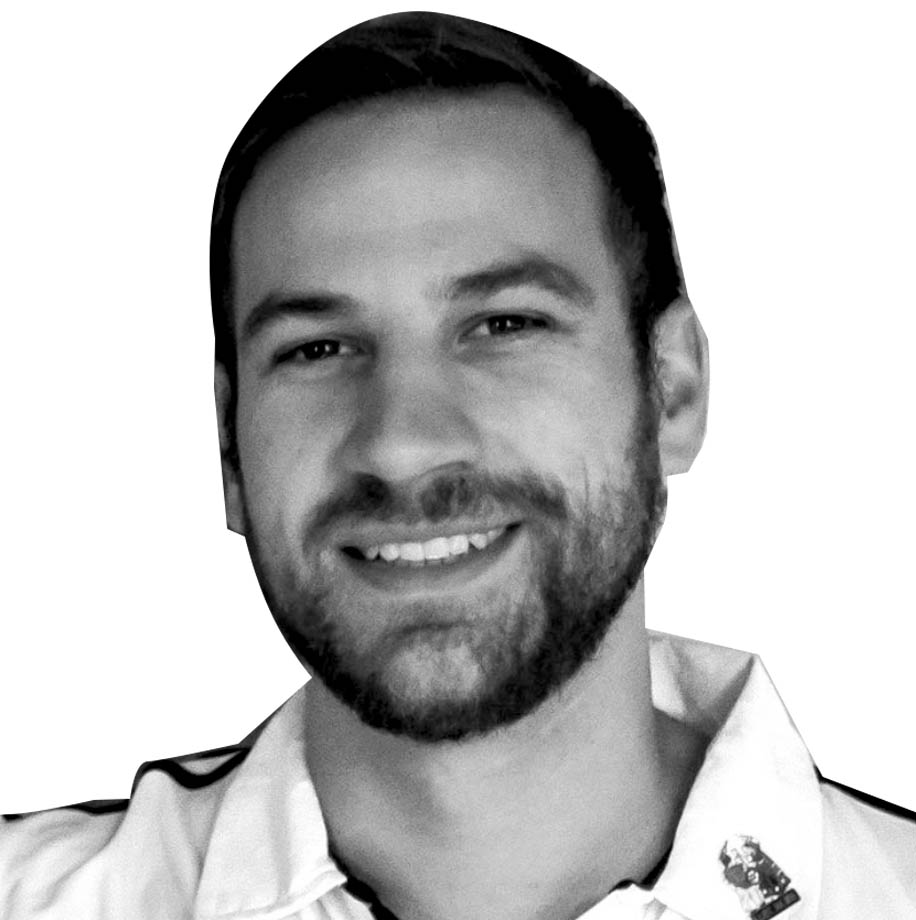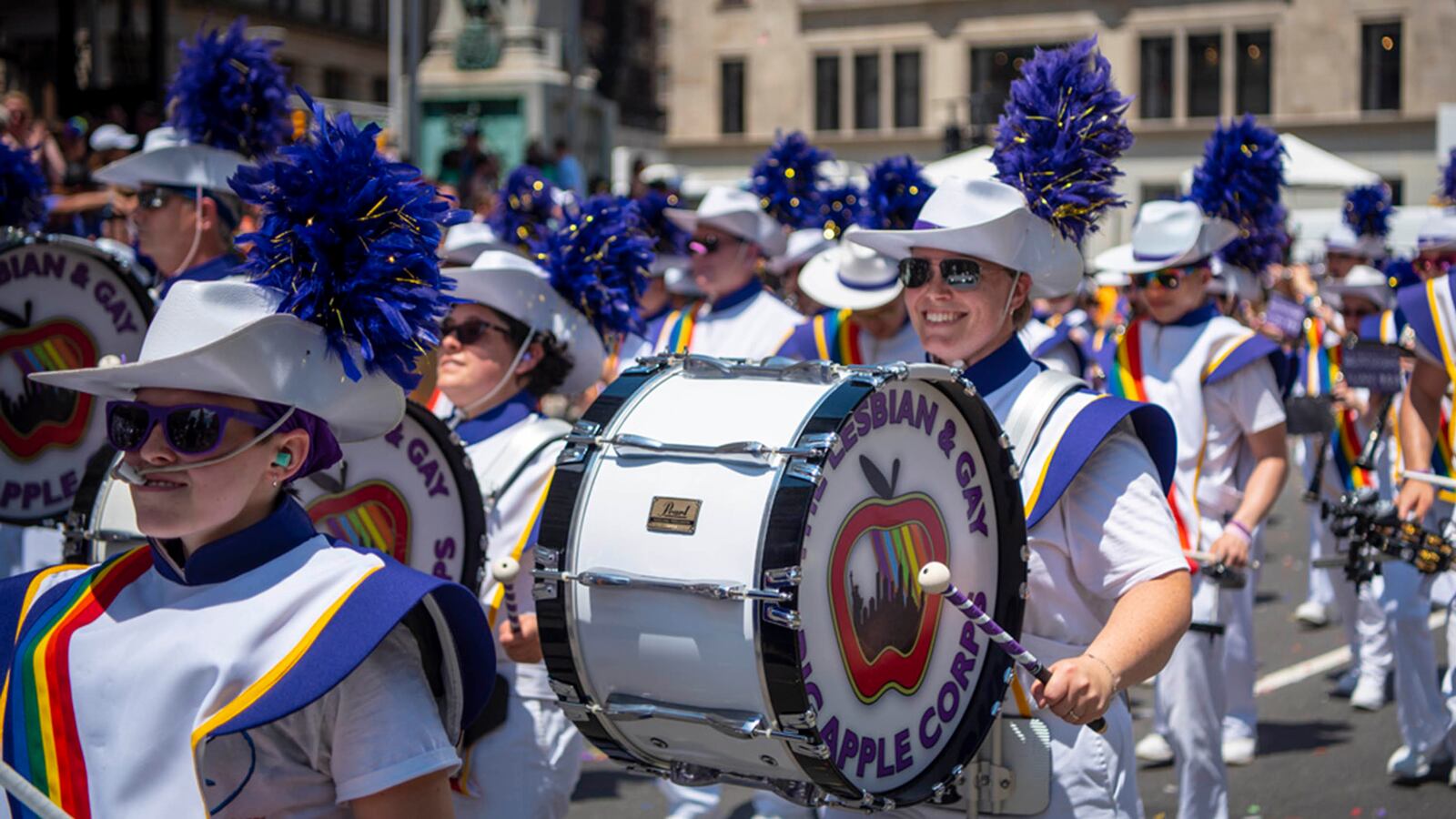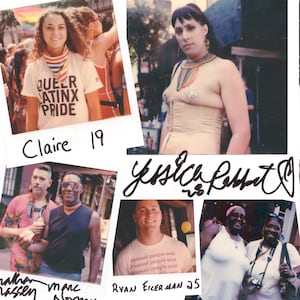A year ago, 160 members of the Lesbian & Gay Big Apple Corps (LGBAC), New York’s oldest LGBTQ marching band, eagerly waited at the start line of the World Pride 50 parade in New York.
Neil Patrick Harris climbed a nearby float and waved his hands, conducting the starstruck band below. New York Mayor Bill de Blasio strode by, lifting a rainbow flag high above his head. Hundreds of pink T-Mobile balloons peppered the band’s starting pen.
The day’s visual—an estimated 5 million partygoers thronging Manhattan’s streets—is now unimaginable. But the reception from last year—the open arms of celebrities, politicians and corporations—was once unimaginable too.
Handcuffed by social distancing guidelines, the LGBAC is forced to settle for some virtual firsts this year. Throughout June, it is hosting a series of livestream events, Marching with the Band (including one tomorrow, scheduled for Rhode Island Pride, and one on June 27 for New York Pride).

Rehearsals are continuing as scheduled over Zoom, and it has just released a 117-member live-recorded video performance of one of the five songs in its 2020 catalogue, The Who’s “Baba O’Riley.”
With the annual marching season spanning March to July, New York’s COVID lockdown has devoured the band’s 2020 season. The LGBAC was set to perform in parades in New York, DC, Providence, and Princeton—all of which have been cancelled.
“We had the highlight of our year ripped out of our hands,” said Marita Begley, LGBAC’s artistic director.
Luckily for the band, momentum is on its side. They’ve already grown out of obscurity to perform at meccas of Americana like pro sports games and Carnegie Hall. They’ve marched in both of President Obama’s inaugural parades.
Founded by musicians Nancy Corporan and Bob Wolff in 1979 as the New York Gay Community Marching Band (the name changed in 1983), the two recruited members by setting up card tables and chatting up passersby in Sheridan Square in Manhattan’s West Village. To advertise, they posted flyers with the tagline “Get your instrument out of the closet” around Greenwich Village coffee shops.

For many early recruits, the band provided a much-welcomed alternative to LGBT social life.
“Back then it was the only place that men and women could be together without being in a bar and being drunk in the dark,” said Marsha Stone, a band member since 1980.
The new band got members out of the bars and into the streets, and the times quickly turned the musicians into activists.
In November of 1980, a gunman opened fire into the Ramrod, a West Village gay bar, killing two and injuring six. At a candlelight vigil in response to the massacre, the band played a funeral cadence for over a thousand mourners.
During the AIDS crisis of the eighties and nineties, the band lost 33 members to the disease.
“It was a sad, scary time in the eighties, but part of survival is honoring the ones we lost,” Corporan said. “It gives an extra motivation for doing what we do.”
“We have a little slogan in the band: ‘We change hearts and minds one song at a time,’” said Brooklyn trumpeter Joe Avena, referencing the band’s hard-won ascent.
This might not be the June the band intended, but it’s one their history has prepared them for.
“Young people sometimes say that all the mountains have been climbed and there are no more battles,” Begley said. “I tell them there is always another mountain, and here we are. We are writing the history of how the band triumphed over adversity again.”
Meet the Band

Jacqui Aquilino-Jirak (highlighted) in vintage photograph of the band
Courtesy Roberta F. RaeburnJacqui Aquilino-Jirak
Hometown: Mount Vernon, New York
Age: 72
Instrument: Clarinet
Years in the band: 41
I would get nervous sometimes when we marched. Once we marched and we heard people telling us to go home and “What are you doing here?” and that kind of stuff. But you did it. I was nervous. You didn’t know what was going to happen, but you just hoped for the best.
Most of our experiences were good experiences. Most people were just happy to hear “Stars and Stripes Forever.” But you never knew when someone was going to verbally assault you. Things were thrown at us here and there, but we knew going in that that might happen. But what do you do when you face that adversity? Either you’re going to be out there or not. And those who didn’t want to be there weren’t there.
We have a band now that is 120 people because it’s safer for them to come on the streets. We couldn’t have 120 then because there wasn’t 120 people who had the nerve to go out there and do it, you know? And you can’t blame them. I’m not judging them—I’m not. People had reasons to be afraid—they’d lose their job or get thrown out of school. They had good reason.
We were playing for ourselves—for our group—for our community. It was a personal thing.
We were there for our community.

Marsha Stone, in purple headband, with Joe Avena.
Seth Kessler for The Daily BeastMarsha Stone
Hometown: Bayside, Queens, NY
Age: 67
Instrument: Trumpet
Years in the band: 41
A long time ago in a galaxy faraway, six years after homosexuality was removed from the American Psychiatric Associations’ list of mental illnesses and 33 years before same sex marriage was federally recognized, I found a small group of musicians starting a marching band.
They were playing for a gay business group on Hudson Street. I was invited to take my trumpet out of the closet and join them, and it changed my life.
As I reflect on the past, I remember the things we feared back then, like the Ramrod massacre in 1980. I remember people too afraid to march with us for fear of losing their jobs or being shunned by their families. I remember the AIDS epidemic that stole so many of our members.
The band brought so much joy and camaraderie into my life that it made those fears and painful memories only passing thoughts.

Shareef Jenkins
Courtesy Christine JeanShareef Jenkins
Hometown: Philadelphia, PA
Age: 42
Instrument: Trumpet
Years in band: 13
When I joined the band, I was feeling alone in this big city of New York—like I had yet to find my tribe. An acquaintance who was in the band found out that I played the trumpet in high school, and one day before a rehearsal came to my apartment and said, “You’re coming to play with the band.”
I gave every excuse as to why I couldn’t: no trumpet, depression—all true things. I went and immediately I felt welcomed by the trumpet section captain and by Marita, the marching band director. They gave me a trumpet. My depression subsided, and playing in rehearsals was the highlight of my week.
The first time I marched I was nervous, but as soon as the crowd started cheering, this validating energy and pride overtook me, and I knew I was in the right place.

Eric Rouda, highlighted, in a vintage photograph of the band.
Courtesy Roberta F. RaeburnEric Rouda
Hometown: Mount Vernon, NY
Age: 67
Instrument: Euphonium
Years in the band: 41
A week before September 11 we performed in Jersey City. It freaks me out. There’s a picture of us with the World Trade Center in the background.
After the attacks on September 11, everyone was checking in on everybody else. We had people who worked in the Trade Center and people who worked in the area.
What came out of that was a realization by everybody that we are a family, and that it’s as important as your blood family—and a message to the new people is that if it’s not yet, it will be.
I went through it also when Gregg was sick. (Gregg Flaum, Eric’s former boyfriend, died of AIDS in 1989.) I can’t tell you how many people would come to the hospital just to be with him and be with me. Hundreds of people showed up at the funeral. They took off from work and they showed up to be with me. I carry that with me always. It’s always there. I’m not the center of attention anymore but I still feel that family bond. It’s there.

Bill Jiang
Seth Kessler for The Daily BeastBill Jiang
Hometown: Guangdong, Guangzhou, China
Age: 24
Instrument: Piano & percussion
Years in the band: 2
This band has changed my life—just too many things to mention. Homosexuals, we have been through many bad things in our lives. We shame on ourselves and beat ourselves up.
At my first parade I saw some bad signs that said “Homos Go To Hell” or something like that, and I was pretty attacked by that. I felt, “Oh my god why am I here? Why am I exposed like this?” But then the band played the song louder and louder. It was like positivity fighting the negativity.
That was a time when I felt like, “Oh, I’m actually in a very safe place, and I don’t need to worry about that.” And that kind of shame just went away. I don’t know if that’s forever, but that was a very positive time for me.
Being in the band is a way of accepting yourself and loving yourself. I’ve never loved myself and been proud of myself like this before and that’s not just about sexuality—it’s about how you live.







